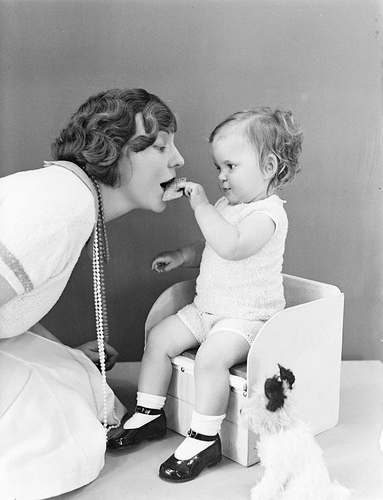 As adults it is be very difficult to learn new languages – especially if these are languages that have vastly different sounds.
As adults it is be very difficult to learn new languages – especially if these are languages that have vastly different sounds.
Obviously we are born with the ability to hear all sounds. However, by the end of our first year we have lost the ability to hear sounds not present in the language used by our carers. This ability is generally lost between 10 and 12 months of age.
Patricia Kuhl, co-director of the Institute for Brain and Learning Sciences at the University of Washington, conducted a research project with American babies aged between 10 and 12 months to see if this loss was reversible.
These babies, who had never heard any language other than English, were exposed to 12 sessions of Mandarin Chinese.
The first lot of babies were exposed to Mandarin by way of a native speaker who came and played and spoke with them.
By the end of the twelve sessions, these babies had recovered their ability to hear sounds in Mandarin and were as proficient as babies of the same age who had been listening to Mandarin all of their lives.
Two other groups of babies, of exactly the same age, were also exposed to 12 sessions of Mandarin. One group of babies were shown the sessions on a TV, the other just had an audio soundtrack while being shown a picture of a teddy bear.
Neither of these groups made any progress in their ability to hear the sounds in Mandarin.
Patricia Kuhl and her researches concluded that the babies’ learning was controlled by their social brain and therefore only turned on when they were interacting with another human being.
If babies learn best when interacting with other human beings, maybe that is true about how we learn all sorts of things and not just language?
And perhaps it is true not only in infants but also in adults?
If so, does this research have any implications for our educational systems both formal and informal?
At the very least, when we interact with babies – even as strangers – what are they learning from us?
The video is here – (I realise there are more babies but they are pretty cute…)
[ted id=1075]
__________________________________________________
Related articles
- Six-Year Old Girl on Track to Learn 4th Language (themactrack.com)
- Hearing bilingual: How babies sort out language (seattletimes.nwsource.com)
- Bilingual, Bicultural and Brilliant! Institute for Learning & Brain Sciences Celebrates Diversity at NYC’s Ultimate Block Party Event (prweb.com)
- Bilingual Babies’ Vocabulary Linked to Early Brain Differentiation (scienceblog.com)
- Bilingual brain may start to fade by age 1 (holykaw.alltop.com)
- Bilingual Homes Help Babies Exercise Their Brain (nlm.nih.gov)
- Bilingualism is Good Brain Exercise for Kids (and Adults) (profesorbaker.wordpress.com)
- Language Acquisition in babies (aboxofthistles.wordpress.com)
- “The First 2,000 Days are Critical” (eyeonearlyeducation.org)
- Bezos Family Foundation Announces $5 Million Gift to University of Washington’s Institute for Learning and Brain Sciences Developing Mind Project (prweb.com)
Interesting video. Thanks, Patrecia.
It raises a lot of interesting issues about how we learn – thanks for the comment, Nancy.
What an amazing post. I just found your blog because of a clickback to mine. I have been glued to it ever since. This post is especially fascinating and I didn’t want it to end. I’m glad I found you.
Beth, you are very kind – thank you for your comment – I am delighted you are enjoying the posts. I very much enjoyed yours also – I wish I could produce such lovely work! Glad to meet you too.
That’s very interesting. I “know” through reading and a few second-hand experiences that children up to an age of four are generally able to produce correct “language sounds” not found in the language they are surrounded by. They can also “loose” this ability within months if they don’t practice by listening to authentic sources. – What surprises me is that Patricia Kuhl’s research shows a decline of this ability already at a much younger age.
I remember that on holidays as a child (younger than ten) I picked up local accents within a few days, but when I went (age 12) for a year as an exchange student, I did not loose my native accent.
The difference in results with regards to source material makes me wonder…most language courses (in school and for self-study) are based on recordings. But maybe, as the students are older anyway, it doesn’t really matter? 😉
If you look at the graph she shows there is a steep decline after adolescence – before that it drops and drops but in comparison to adults, children are still reasonably sensitive to learning new languages, which fits with your experience. I think your other question is the most salient point of the whole research! Maybe the social interaction doesn’t matter to adults as much as babies – babies are more physically vulnerable etc but I have to wonder if it has some effect? I wish they’d do some research on how relevant the ‘social brain’ is in adult – and also child and adolescent – learning. If memory is enhanced by heightened emotions (and it is, I believe) and as most experiences of heightened emotion involve other people, then surely this at the very least (logically) has an effect on adult learning.
Or maybe not.
Maybe it just seems that way to me?
Thanks for your comment, Maria.